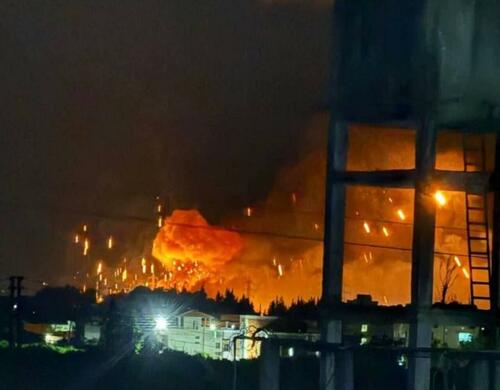Russian Anti-Air Missiles Likely Engaged Israeli Jets Attacking Syria’s Coast
Israeli strikes have hit Syria for multiple straight days, with the latest being on the outskirts of Damascus, in the western part of the Rif Dimashq Governorate near Lebanon, on Thursday morning. Syrian national media says anti-air defense missiles are confronting “hostile targets”.
But it was an overnight major attack on Syria’s coast which has for the first time brought Israel close to clashing with the Russian military. An Israeli drone as well as warplanes reportedly targeted sites in the coastal Syrian city of Jableh before daybreak. A weapons depot was apparently targeted and destroyed, which crucially was situated near the Hmeimim Air Base, the largest Russian air base in Syria.
Widely circulating image of alleged Israeli strike on weapons depot in Jableh, via X.
Chinese state media has cited a war monitor to say that “Syrian air defenses and Russian forces responded to the attack within 40 to 50 minutes.”
Large explosions were heard and witnessed throughout the area, and resulted in large fires, to which emergency personnel responded.
The same aforementioned report detailed that “While there is no official confirmation, the pro-government Sham FM radio said the sounds heard in the skies over Jableh were the air defenses intercepting targets off the coast.”
Unverified reports in Arabic media say that the Russian airbase was directly struck, but other reports dispute this:
Syria TV:
📌 Israel bombed Russia’s Hmeimim airbase an hour after the arrival of an Iranian plane belonging to “Qeshm” Airlines.
📌 The Israeli strike did not target the runways or towers at Hmeimim Airbase and Latakia’s civilian airport.
📌 The bombing targeted other military… pic.twitter.com/UxBU8iWHZm
— Levant 24 (@Levant_24_) October 3, 2024
The Times of Israel also commented on the rare coastal attack, saying “Some Syrian opposition outlets claim that the targeted warehouse was inside Russia’s Hmeimim Airbase.”
Regardless, what is clear is that the strikes were at least very close to the Russian airbase, creating the strong likelihood that Russian anti-air defenses were triggered into action.
Throughout the Syrian proxy war, there had been many close calls where Israel and Russia nearly clashed, but this has been carefully avoided.
The most deadly example involved a September 2018 Israeli attack on Syria which ended in the downing of a large Russian reconnaissance plane. It had been patrolling over the Syrian coastal area during a surprise Israeli air raid, but was reportedly struck by ‘friendly fire’ from Syrian anti-air batteries as they attempted to repel the Israeli planes. 15 Russian crew members were killed.
So far there has been no official government confirmation that Russia engaged inbound Israeli jets in this newest incident over Jableh and Hmeimim Air Base. Russian accounts have denied that the base was directly attacked. Moscow has tended to downplay prior incidents, perhaps wishing to maintain its delicate relations with Israel to avoid escalation.
Israel reportedly struck a warehouse of Iranian and Syrian weapons (you can see missiles or rockets cooking off) in the town of Jableh near the main Russian base of Hmeimim in Syria. The base itself has not been touched, per Russian accounts, and the Russians apparently tried to… pic.twitter.com/kyTlaPWWnu
— Yaroslav Trofimov (@yarotrof) October 3, 2024
* * *
Syrian and regional analyst Kevork Almassian has provided the following commentary [emphasis ZH]…
Israel’s recent large-scale military aggression on the Syrian coast near the city of Jableh could mark a significant turning point in the ongoing regional conflict. This attack followed a meeting on Wednesday between Alexander Lavrentiev, Russian President Vladimir Putin’s Special Envoy on Syria, and Ali Akbar Ahmadian, Secretary of Iran’s Supreme National Security Council (SNSC).
During the talks, Lavrentiev expressed hope that Israel would heed Iran’s warnings. Israel appears to have interpreted this meeting, along with Lavrentiev’s statements, as tacit Russian approval of Iran’s retaliatory actions. Consequently, Israel targeted warehouses of the Russian forces. This likely explains the joint response from Syrian and Russian air defenses, marking a departure from previous Israeli strikes, where Russia had refrained from direct involvement in the defense effort.
Following the conclusion of the attack at 5:50 AM, a Russian air patrol was observed over Latakia. The Israeli strike on a Russian facility in Syria is a serious escalation. Netanyahu’s actions suggest he is no longer solely confronting the “Axis of Resistance” but is also risking Russian interests. Should Moscow choose to respond, it could dramatically alter the balance of power in the region.
Tyler Durden
Thu, 10/03/2024 – 13:45

